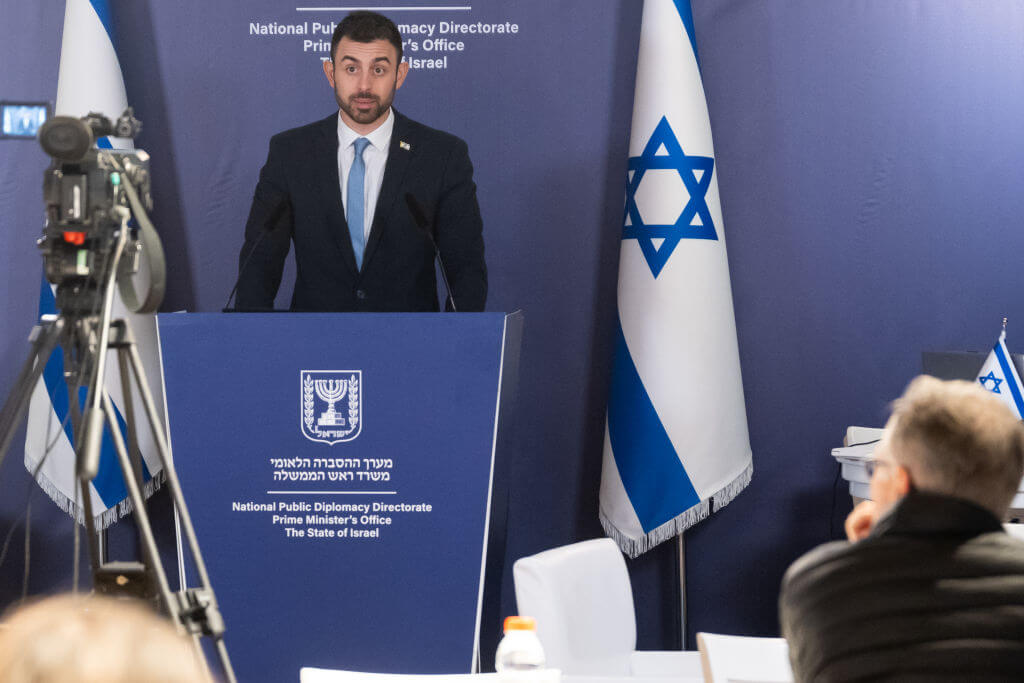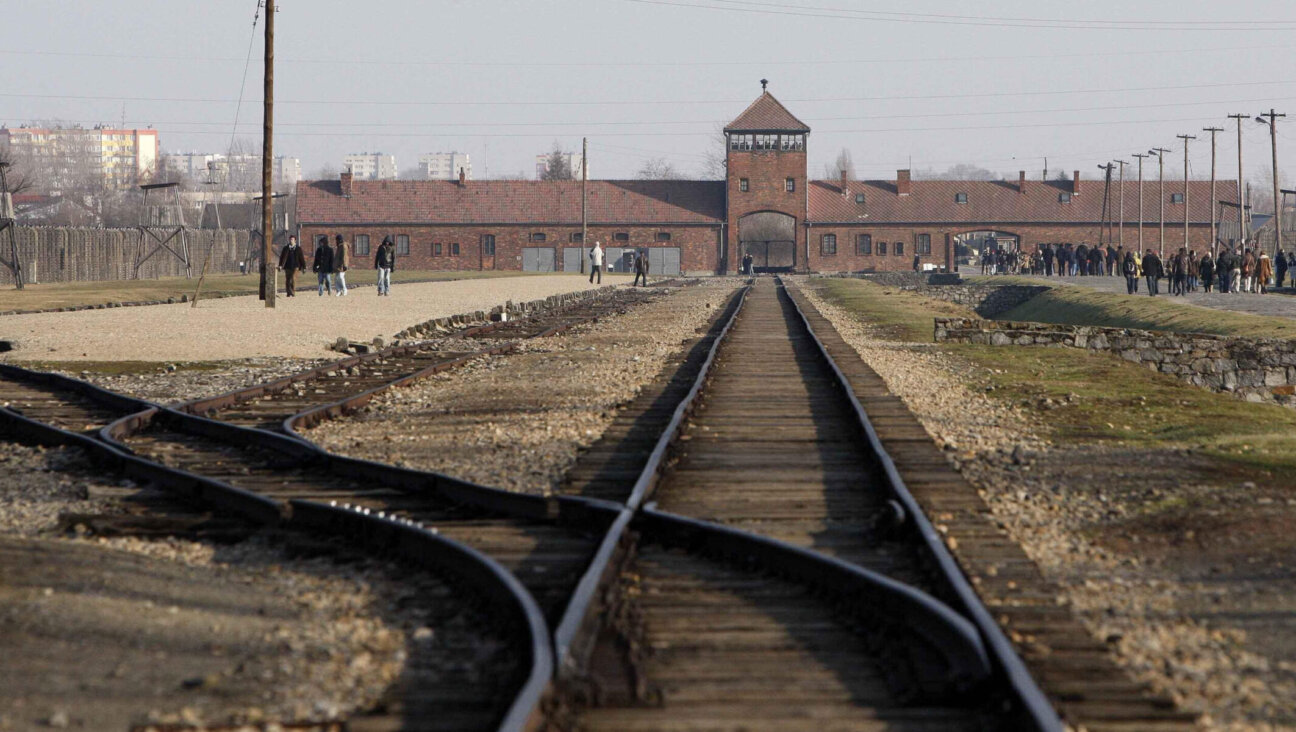Eylon Levy, Israel’s savvy English-language spokesman, is earning admirers — and reportedly one very significant enemy
Sara Netanyahu is reportedly upset about a popular spokesman’s past comments about her husband, Prime Minister Benjamin Netanyahu

Eylon Levy, Israeli government spokesperson, speaks to members of the media on November 28, 2023 in Tel Aviv, Israel. Photo by Getty Images
(JTA) — Roughly twice as many people have viewed a single instance of Eylon Levy raising his eyebrows as there are citizens of the country he was defending when he did it.
“Does Israel not think that Palestinian lives are valued as highly as Israeli lives?” Sky News journalist Kay Burley asked Levy, a spokesperson for the Israeli government, on live TV in late November, as Israel was in the process of releasing three Palestinian prisoners for each Israeli hostage freed from Gaza.
“That is an astonishing accusation,” Levy responded, his expressive eyebrows shooting up in disbelief. “If we could release one prisoner for every one hostage we would obviously do that,” he retorted.
He shared the clip in a tweet that went viral and has now been seen more than 16 million times. It was, he wrote, “the first question that left me speechless (but only for a second).”
It was also a breakout moment for the British-accented Oxbridge graduate who has been called “Israel’s prince of public diplomacy,” known in Hebrew as hasbara. Tens of thousands of people flooded to watch him on social media, increasing his follower count on X, formerly Twitter, by more than sevenfold, to 175,000; he has another 178,000 on Instagram. He began to draw attention on the street. And his social media antics gave Israel a powerful weapon in the bruising social media battles that have become ever more intense since Oct. 7.
Now, in a sign of how Israel’s wartime unity is fraying, Levy is finding himself embattled — by Sara Netanyahu, the wife of Prime Minister Benjamin Netanyahu, who reportedly holds it against Levy that he criticized her husband’s leadership before Oct. 7. An initial report that he would be pushed out of the National Public Diplomacy Directorate has been batted back, but rumors are still swirling that he could face consequences because of Sara Netanyahu’s famous ire.
Levy’s exit, if it comes, would strip the prime minister’s office of one of its savviest public defenders at a time when international opinion is turning more strongly against the Israeli war effort.
“He’s a very smart guy and well spoken and it was something that was incredibly lacking in the beginning of the war,” Israeli policy analyst and pro-Israel influencer Eli Kowaz said about Levy. “He was able to talk to all these international news outlets and make a lot of important points.”
Levy declined to comment on Monday, instead referring questions to the prime minister’s office. The office denied reports that he could be penalized for his politics, saying, “The directorate works according to professional standards.”
Levy’s biography and import are well established at this point, as he has become a familiar face for anyone consuming news or social media about Israel.
Born in London to Israeli parents, Levy studied first at Oxford University, where he was involved in debate. (A far-left member of Parliament famously walked out rather than debate Levy, saying he did not debate Israelis.) He then earned a graduate degree in international relations from Cambridge, researching the impact of Jewish immigrants from Arab countries, including his own grandparents, on Israel’s development.
From there, he moved to Israel, arriving at the end of the 2014 Gaza War. Enlisting in the Israeli Defense Forces, he was assigned to the unit responsible for implementing Israeli civil policy in the West Bank and Gaza in coordination with the Palestinian Authority and other international groups. After his service, he spent several years as a news anchor on Israeli television before joining the office of Israeli President Isaac Herzog as its international media advisor. (On the side, he translated Israeli books into English, including a 2021 memoir that made him a finalist for a prestigious translation prize.)
In the middle of 2023, Levy quit his job in Herzog’s office. The country had been torn apart by a proposal from Netanyahu’s right-wing government to overhaul Israel’s judiciary. Proponents of the changes said they were necessary to bring the judiciary more in line with the will of the people. Critics — including a wide array of international legal scholars — said they would erode Israeli democracy. Weekly protests had come to define the country.
As Herzog sought to broker a compromise, Levy sided with the critics, becoming an even more outspoken pro-democracy protester after leaving his government post, regularly appearing at rallies and passionately expressing his opposition to the current government on social media.
“The government’s plan to effectively abolish judicial review and give the executive the power to appoint all judges would eliminate any separation of powers, remove a major check and balance, and effectively deny judicial independence,” he tweeted on July 1, as the first elements of the plan neared a vote.
His personal criticism of Netanyahu continued into the first days of the war. “This will be Netanyahu’s legacy,” he tweeted on Oct. 8, the day after the attack. “Not the COVID vaccines. Not the Abraham Accords. Not the judicial reform or the protests. The history books will open with one of the deadliest terror attacks in world history, on his watch, after nearly 15 years in charge of our security.”
But he soon drafted himself to the government’s defense, joining the hundreds of thousands of Israelis who set aside their objections to the government in favor of a unified, powerful response to Hamas’ attack, which left about 1,200 dead and 240 in captivity.
Levy explained his decision to join the government he once excoriated in an interview with Globes, an Israeli magazine. “Like many, I participated in the protests against the reform. It’s no secret,” he said. “There was Israel before October 7 and there is Israel after. Nothing will return to what it was before. There is now only one task: to win the war, and for that we must put the wars of the Jews aside and unite.”
Levy’s addition to the government’s public advocacy team came at a crucial time, with the National Public Diplomacy Directorate in a state of disarray. Its leader, Likud Knesset member Galit Distel Atbaryan, resigned on Oct. 13 after being criticized for speaking English poorly.
In contrast, Levy’s flawless native English made him a successful sparring partner on news programs around the world. In another sharp viral exchange, Levy took aim at Irish Prime Minister Leo Varadkar on Nov. 26.
Varadkar had tweeted about the release from captivity of a 9-year-old Israeli girl whose father is Irish. “This is a day of enormous joy and relief for Emily Hand and her family,” he wrote. “An innocent child who was lost has now been found and returned, and we breathe a massive sigh of relief. Our prayers have been answered.”
Levy tore into Varadkar, a longtime critic of Israel. “Emily Hand wasn’t ‘lost,’” he wrote, his disdain dripping from the screen. “She was brutally abducted by the death squads that massacred her neighbors. She wasn’t ‘found.’ Hamas knew where she was all along and cynically held her as a hostage. And Hamas didn’t answer your prayers. It answered Israel’s military pressure.”
Not all of Levy’s viral moments have reflected in-the-moment anger. On TikTok, where he posts videos with the help of a social media team, he has tapped into trends, joking about what’s out for 2024 (“Calling to globalize the intifada and a ceasefire at the same time; the math isn’t mathing,” he said) and producing a riff on a famous scene from the movie “Love Actually” for Christmas.
@eylonalevy Surrender, actually #israel #israeligovernment #israelhamaswarupdate #eylonlevy #loveactually ♬ original sound - Eylon A Levy ??
His posts — and eyebrows — have won him admirers. A Reddit post from last week titled “Eylon Levy appreciation post” has more than 100 comments, including from both men and women expressing romantic interest in him. “He[‘s] super hot and super smart. He’s also really brave and resilient, and has a very Jewish ethos,” one wrote. “He’s total fantasy crush material.”
Levy has fans in the Knesset, too. On Sunday, after the report first emerged that he could be pushed out, Zeev Elkin, the National Unity Party member who heads the subcommittee of external affairs and advocacy, addressed a letter to the head of the public diplomacy office.
“The importance of hasbara for the State of Israel in light of the war is self-evident. In our subcommittee meetings, the name of Eylon Levy was raised, a spokesperson for the National Public Diplomacy Directorate, several times in positive contexts,” Elkin wrote before asking for clarification on Levy’s future employment and if “pressure from outside forces” was being used to end his government tenure.
Sara Netanyahu looms large in Israeli politics, where she is seen as taking extreme measures behind the scenes to protect her husband, sometimes in seeming opposition to his interests. She recently made headlines for reportedly accusing hostages’ families of bolstering Hamas by pressuring Netanyahu to seek an immediate hostage-for-prisoner deal no matter the cost. She is also famous for holding grudges.
While Levy’s role appears to be safe for now, the controversy and the fact that it surprised no one remains meaningful, Kowaz said.
“What is most problematic is the entire functioning of the government being driven by the political and personal interests of Netanyahu,” he said. A damning survey by Israel’s Channel 13 found this week that 53% of respondents believe the prime minister’s wartime decision-making is primarily motivated by personal interest, while 33% said he is acting for the good of the country.
As for Levy, he returned this week from a quick trip to England where he helped mark 100 days since Oct. 7 by speaking in Trafalgar Square. He has continued posting without interruption — or acknowledgment of the tumult reported about his role. And on Tuesday morning, he was in front of the TV cameras for the Israeli government’s daily English-language press briefing for the first time in a week.
This article originally appeared on JTA.org.
A message from our Publisher & CEO Rachel Fishman Feddersen

I hope you appreciated this article. Before you go, I’d like to ask you to please support the Forward’s award-winning, nonprofit journalism so that we can be prepared for whatever news 2025 brings.
At a time when other newsrooms are closing or cutting back, the Forward has removed its paywall and invested additional resources to report on the ground from Israel and around the U.S. on the impact of the war, rising antisemitism and polarized discourse.
Readers like you make it all possible. Support our work by becoming a Forward Member and connect with our journalism and your community.
— Rachel Fishman Feddersen, Publisher and CEO





















